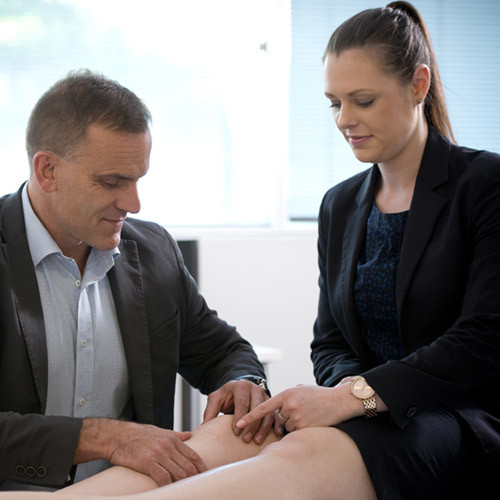
Patellofemoral Dislocation
Patellofemoral dislocation happens when the patella (kneecap) becomes detached from the femur (thigh bone) and moves out of its regular place.
The injury is extremely painful and will prevent the sufferer from walking, though it is fortunately much less serious than other dislocation injuries. A dislocated kneecap will often correct by itself, though consulting an orthopaedic surgeon is recommended nonetheless to prevent complications and identify issues that may prevent adequate healing.
Orthopaedic surgeons at Orthopaedics SA consult and operate throughout Adelaide and beyond. For an expert opinion regarding your knee injury, contact the friendly team at Ortho SA.
Patellofemoral dislocation is most often caused either by direct impact or by a non-contact twisting injury to the knee. The patella is much easier to dislocate than other joints and may happen with less force as a result – some people experience their kneecap dislocating after just a misplaced step that uses their body weight against them.
Because children and teenagers have looser ligaments, they are more likely to experience patella dislocation than others. Athletes who compete with high impact in their sports (like tackling) or who make twisting motions frequently (such as pivoting in volleyball or while dancing) are often casualties also.
· A loud popping sound at the time of injury
· The knee feeling unstable or giving way
· Intense pain
· Redness, bruising and swelling of the knee
· The kneecap looks physically deformed or out of place
As patellofemoral dislocations usually present with a noticeable physical deformity, your doctor can diagnose it with a physical exam alone. They will ask questions about how the injury occurred and your personal medical history. Because dislocated joints are easier to relocate soon after the initial injury, doctors may perform a joint reduction on the injured knee before seeking other tests.
After the joint reduction, your doctor may request X-rays, MRIs, or other imaging tests to assess the knee bones and other soft structures in the knee.
A dislocated patella sometimes corrects itself when the leg is carefully straightened. You may be able to relocate your own dislocated kneecap as a result, but seeing an orthopaedic surgeon for assessment is still highly recommended. If the patella cannot be relocated in the field (either by a paramedic or by yourself), a doctor can administer muscle relaxers to help the joint go back to normal.
A short period of rest and immobilisation is sufficient to heal many patellofemoral dislocations, followed by diligent physiotherapy to promote recovery and prevent future complications. Surgery is not often needed unless other structures in the knee are also damaged.
Surgery is sometimes used to repair damage to the knee’s bone, cartilage, and tendons if they are significantly damaged in the initial dislocation. Surgery for patellar dislocation is very successful at maintaining the knee’s long-term stability, but these injuries may be associated with knee arthritis in the long term.
As with any condition, the exact course of treatment recommended to you can vary according to the specific nature of your injury and your overall health. For an expert assessment of your injury, contact Orthopaedics SA to book a consultation with one of our Adelaide specialists.
Knee Treatments
















